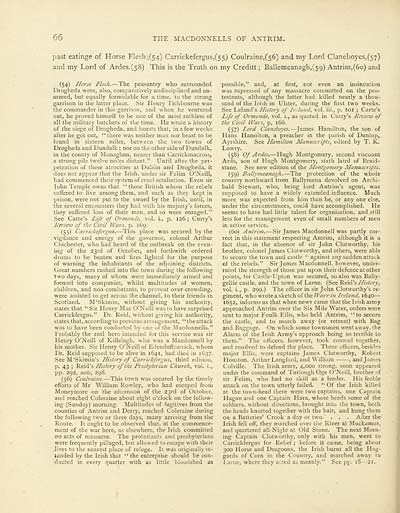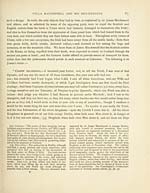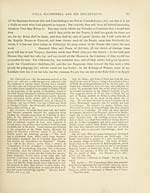Historical account of the Macdonnells of Antrim
(80) Page 66
Download files
Complete book:
Individual page:
Thumbnail gallery: Grid view | List view

66
THE MACDONNELLS OF ANTRIM.
past eatinge of Horse Flesh ^(54) Carrickefergus,(s5) Coulraine,(56) and my Lord Claneboyes,(57)
and ray Lord of Ardes.(58) This is the Truth on my Creditt ; Ballemeanagh,(59) Antrira,(6o) and
(54) Horse Flesh. — The peasantry who surrounded
Drogheda were, also, comparatively undisciplined and un-
armed, but equally formidable for a time, to the strong
garrison in the latter place. Sir Henry Tichbourne was
the commander in this garrison, and when he ventured
out, he proved himself to be one of the most ruthless of
all the military butchers of the time. He wrote a history
of the siege of Drogheda, and boasts that, in a few weeks
after he got out, " there was neither man nor beast to be
found in sixteen miles, between the two towns of
Drogheda and Dundalk ; nor on the other side of Dundalk,
in the county of Monaghan, nearer than Carrickmacross,
a strong pile twelve miles distant." Until after the per-
petration of these atrocities at Dublin and Drogheda, it
floes not appear that the Irish, under sir Felim O'Neill,
had commenced their system of cruel retaliation. Even sir
]ohn Temple owns that " those British whom the rebels
suffered to live among them, and such as they kept in
prison, were not put to the sword by the Irish, until, in
the several encounters they had with his majesty's forces,
they suffered loss of their men, and so were enraged."
See Carte's Life of Ormonde, vol. i., p. 126 ; Curry's
Review of the Civil Wars, p. 169.
(55) Carrickefergiis, — This place was secured by the
vigilance and energy of the governor, colonel Arthur
Chichester, who had heard of the outbreak on the even-
ing of the 23rd of October, and forthwith ordered
drums to be beaten and fires lighted for the purpose
of warning the inhabitants of the adjoining districts.
Great numbers rushed into the town during the following
two days, many of whom were immediately armed and
formed into companies, whilst multitudes of women,
children, and non-combatants, to prevent over-crowding,
were assisted to get across the channel, to their friends in
Scotland. M'Skimin, without giving his authority,
states that " Sir Henry Mac O'Neill was to have surprised
Carrickfergus." Dr. Reid, without giving his authority,
states that, accordingto previous arrangement, "theattack
was to have been conducted by one of the Macdonnells."
Trobably the real hero intended for this service was sir
Henry O'Neill of Killelagh, who was a Macdonnell by
his mother. Sir Henry O'Neill of Edenduffcarrick, whom
Dr. Reid supposed to be alive in 1641, had died in 1637.
See M'Skimin's History of Carrickfergus, third edition,
p. 43 ; Reid's History of the Presbyterian Church, vol. i.,
pp. 292, note, 29S.
(56) Coulraine — This town was secured by the timely
efforts of Mr William Rowley, who had escaped from
Moneymore on the afternoon of the 23rd of October,
and reached Coleraine about eight o'clock on the follow-
ing (Sunday) morning. Multitudes of fugitives from the
counties of Antrim and Deny, reached Coleraine during
the following two or three days, many arriving from the
Route. It ought to be observed that, at the commence-
ment of the war here, as elsewhere, the Irish committed
no acts of massacre. The proteslants and presbyterians
were frequently pillaged, but allowed to escape with their
lives to the nearest place of refuge. It was originally in-
tended by the Irish that " the enterprise should be con-
ducted in every quarter with as little bloodshed as
possible," and, at first, not even an insinuation
was sxpressed of any massacre committed on the pro-
testants, although the latter had killed nearly a thou-
sand of the Irish in Ulster, during the first two weeks.
See Leland's History of Ireland, vol. iii., p. 101 ; Carte's
Life of Ormonde, vol. i., as quoted in Curry's Review of
the Civil Wars, p, 166.
(57) Lord Claneboyes. — James Hamilton, the son of
Hans Hamilton, a preacher in the parish of Dunlop,
Ayrshire. See Hamilton Manuscripts, edited by T. K.
Lowry.
(58) Of Ardes. — Hugh Montgomery, second viscount
Ards, son of Hugh Montgomery, sixth laird of Braid-
stane. See new edition of the Montgomery Manuscripts,
(59) Ballymeanagh. — The protection of the whole
country northward from Ballymena devolved on Archi-
bald Stewart, who, being lord Antrim's agent, was
supposed to have a widely extended influence. Much
more was expected from him than he, or any one else,
under the circumstances, could have accomplished. He
seems to have had little talent for organisation, and still
less for the management even of small numbers of men
in active service.
(60) Antrim. — Sir James Macdonnell was partly cor-
rect in this statement respecting Antrim, although it is a
fact that, in the absence of sir John Clotworthy, his
brother, colonel James Clotworthy, and others, were able
to secure the town and castle " against any sudden attack
of the rebels." Sir James Macdonnell, however, under-
rated the stiength of those put upon their defence at other
points, for Castle-Upton was secured, so also was Bally-
gellie castle, and the town of Lame. (See Reid's History,
vol. i. , p. 299.) The officer in sir John Clotworthy 's re-
giment, who wrote a sketch of theWarrin Ireland, 1640 —
1652, informs us that when news came that the Irish army
approached Antrim over the Six Mile Water, orders weie
sent to major Foulk Ellis, who held Antrim, "to secure
the castle, and to march away (or retreat) with Bag
and Baggage. On which some townsmen went away, the
Alarm of the Irish Army's approach being so terrible to
them." The officers, however, took counsel together,
and resolved to defend the place. These officers, besides
major Ellis, were captains James Clotworthy, Robert
Houston, Arthur Langfoid, and William , and James
Colville. The Irish army, 4,000 strong, soon appeared
under the command of Turlough Oge O'Neill, brother of
sir Felim, who had no skill as a leader. His feeble
attack on the town utterly failed. " Of the Irish killed
at the town-head there were two captains, one Captain
Hagan and one Captain Hara, whose heads some of the
soldiers, without directions, brought into the town, both
the heads knotted together with the hair, and hung them
on a Batteries' Crook a day or two. . . . After the
Irish fell off, they marched over the River at Muckamur,
and quartered all Night at Old Stone. The next Morn-
ing Captain Clotworthy, only with his man, went to
Carrickfergus for Relief; before it came, being about
300 Horse and Dragoons, the Irish burnt all the Hag-
gards of Corn in the Country, and marched away to
Lame, where they acted as meanly." See pp. iS — 21.
THE MACDONNELLS OF ANTRIM.
past eatinge of Horse Flesh ^(54) Carrickefergus,(s5) Coulraine,(56) and my Lord Claneboyes,(57)
and ray Lord of Ardes.(58) This is the Truth on my Creditt ; Ballemeanagh,(59) Antrira,(6o) and
(54) Horse Flesh. — The peasantry who surrounded
Drogheda were, also, comparatively undisciplined and un-
armed, but equally formidable for a time, to the strong
garrison in the latter place. Sir Henry Tichbourne was
the commander in this garrison, and when he ventured
out, he proved himself to be one of the most ruthless of
all the military butchers of the time. He wrote a history
of the siege of Drogheda, and boasts that, in a few weeks
after he got out, " there was neither man nor beast to be
found in sixteen miles, between the two towns of
Drogheda and Dundalk ; nor on the other side of Dundalk,
in the county of Monaghan, nearer than Carrickmacross,
a strong pile twelve miles distant." Until after the per-
petration of these atrocities at Dublin and Drogheda, it
floes not appear that the Irish, under sir Felim O'Neill,
had commenced their system of cruel retaliation. Even sir
]ohn Temple owns that " those British whom the rebels
suffered to live among them, and such as they kept in
prison, were not put to the sword by the Irish, until, in
the several encounters they had with his majesty's forces,
they suffered loss of their men, and so were enraged."
See Carte's Life of Ormonde, vol. i., p. 126 ; Curry's
Review of the Civil Wars, p. 169.
(55) Carrickefergiis, — This place was secured by the
vigilance and energy of the governor, colonel Arthur
Chichester, who had heard of the outbreak on the even-
ing of the 23rd of October, and forthwith ordered
drums to be beaten and fires lighted for the purpose
of warning the inhabitants of the adjoining districts.
Great numbers rushed into the town during the following
two days, many of whom were immediately armed and
formed into companies, whilst multitudes of women,
children, and non-combatants, to prevent over-crowding,
were assisted to get across the channel, to their friends in
Scotland. M'Skimin, without giving his authority,
states that " Sir Henry Mac O'Neill was to have surprised
Carrickfergus." Dr. Reid, without giving his authority,
states that, accordingto previous arrangement, "theattack
was to have been conducted by one of the Macdonnells."
Trobably the real hero intended for this service was sir
Henry O'Neill of Killelagh, who was a Macdonnell by
his mother. Sir Henry O'Neill of Edenduffcarrick, whom
Dr. Reid supposed to be alive in 1641, had died in 1637.
See M'Skimin's History of Carrickfergus, third edition,
p. 43 ; Reid's History of the Presbyterian Church, vol. i.,
pp. 292, note, 29S.
(56) Coulraine — This town was secured by the timely
efforts of Mr William Rowley, who had escaped from
Moneymore on the afternoon of the 23rd of October,
and reached Coleraine about eight o'clock on the follow-
ing (Sunday) morning. Multitudes of fugitives from the
counties of Antrim and Deny, reached Coleraine during
the following two or three days, many arriving from the
Route. It ought to be observed that, at the commence-
ment of the war here, as elsewhere, the Irish committed
no acts of massacre. The proteslants and presbyterians
were frequently pillaged, but allowed to escape with their
lives to the nearest place of refuge. It was originally in-
tended by the Irish that " the enterprise should be con-
ducted in every quarter with as little bloodshed as
possible," and, at first, not even an insinuation
was sxpressed of any massacre committed on the pro-
testants, although the latter had killed nearly a thou-
sand of the Irish in Ulster, during the first two weeks.
See Leland's History of Ireland, vol. iii., p. 101 ; Carte's
Life of Ormonde, vol. i., as quoted in Curry's Review of
the Civil Wars, p, 166.
(57) Lord Claneboyes. — James Hamilton, the son of
Hans Hamilton, a preacher in the parish of Dunlop,
Ayrshire. See Hamilton Manuscripts, edited by T. K.
Lowry.
(58) Of Ardes. — Hugh Montgomery, second viscount
Ards, son of Hugh Montgomery, sixth laird of Braid-
stane. See new edition of the Montgomery Manuscripts,
(59) Ballymeanagh. — The protection of the whole
country northward from Ballymena devolved on Archi-
bald Stewart, who, being lord Antrim's agent, was
supposed to have a widely extended influence. Much
more was expected from him than he, or any one else,
under the circumstances, could have accomplished. He
seems to have had little talent for organisation, and still
less for the management even of small numbers of men
in active service.
(60) Antrim. — Sir James Macdonnell was partly cor-
rect in this statement respecting Antrim, although it is a
fact that, in the absence of sir John Clotworthy, his
brother, colonel James Clotworthy, and others, were able
to secure the town and castle " against any sudden attack
of the rebels." Sir James Macdonnell, however, under-
rated the stiength of those put upon their defence at other
points, for Castle-Upton was secured, so also was Bally-
gellie castle, and the town of Lame. (See Reid's History,
vol. i. , p. 299.) The officer in sir John Clotworthy 's re-
giment, who wrote a sketch of theWarrin Ireland, 1640 —
1652, informs us that when news came that the Irish army
approached Antrim over the Six Mile Water, orders weie
sent to major Foulk Ellis, who held Antrim, "to secure
the castle, and to march away (or retreat) with Bag
and Baggage. On which some townsmen went away, the
Alarm of the Irish Army's approach being so terrible to
them." The officers, however, took counsel together,
and resolved to defend the place. These officers, besides
major Ellis, were captains James Clotworthy, Robert
Houston, Arthur Langfoid, and William , and James
Colville. The Irish army, 4,000 strong, soon appeared
under the command of Turlough Oge O'Neill, brother of
sir Felim, who had no skill as a leader. His feeble
attack on the town utterly failed. " Of the Irish killed
at the town-head there were two captains, one Captain
Hagan and one Captain Hara, whose heads some of the
soldiers, without directions, brought into the town, both
the heads knotted together with the hair, and hung them
on a Batteries' Crook a day or two. . . . After the
Irish fell off, they marched over the River at Muckamur,
and quartered all Night at Old Stone. The next Morn-
ing Captain Clotworthy, only with his man, went to
Carrickfergus for Relief; before it came, being about
300 Horse and Dragoons, the Irish burnt all the Hag-
gards of Corn in the Country, and marched away to
Lame, where they acted as meanly." See pp. iS — 21.
Set display mode to:
![]() Universal Viewer |
Universal Viewer | ![]() Mirador |
Large image | Transcription
Mirador |
Large image | Transcription
Images and transcriptions on this page, including medium image downloads, may be used under the Creative Commons Attribution 4.0 International Licence unless otherwise stated. ![]()
| Histories of Scottish families > Historical account of the Macdonnells of Antrim > (80) Page 66 |
|---|
| Permanent URL | https://digital.nls.uk/95342207 |
|---|
| Description | A selection of almost 400 printed items relating to the history of Scottish families, mostly dating from the 19th and early 20th centuries. Includes memoirs, genealogies and clan histories, with a few produced by emigrant families. The earliest family history goes back to AD 916. |
|---|

